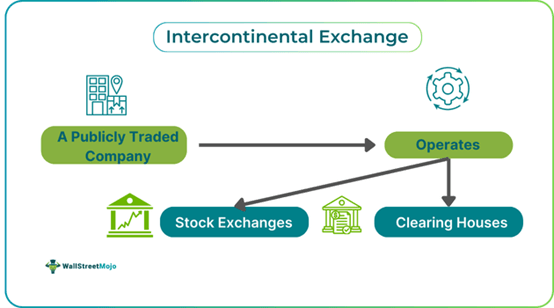Table of Contents
What Is Intercontinental Exchange (ICE)?
Intercontinental Exchange (ICE) refers to a U.S.-based company that operates exchanges such as Liffe futures exchanges, ICE futures exchanges, the New York Stock Exchange, and clearing houses in the financial markets. It facilitates derivatives clearing, global futures exchanges, post-trade services, and over-the-counter (OTC) markets.

It serves as a major online trading platform for financial instruments, promoting greater efficiency and transparency in financial markets by offering real-time pricing updates. Additionally, ICE supports risk management and administers several key clearing houses responsible for trade settlement and clearance.
Key Takeaways
- The Intercontinental Exchange (ICE) is a corporation that operates various stock exchanges and clearing houses for the commodity and financial markets worldwide.
- It facilitates online trading, clearing, and settlement activities, including those on global futures exchanges, OTC markets, derivatives clearing, and post-trade services.
- ICE was originally incorporated in 1997 to provide a more transparent and accessible marketplace for trading, clearing, and settlement in the energy sector, with its global expansion starting in 2000.
- Its major competitors include Nasdaq Inc., S&P Global Inc., London Stock Exchange Plc, and CME Group Inc.
Intercontinental Exchange Explained
Intercontinental Exchange (ICE) Inc. is a publicly traded company managing a network of regulated exchanges, including the New York Stock Exchange, and overseeing clearing houses for the commodity and financial markets. The company focuses on global futures exchanges, OTC markets, derivatives clearing, and post-trade services.
It facilitates the trading and clearing of various products such as energy, agricultural commodities, credit default swaps, equity indexes, and currency contracts. Additionally, it provides risk management services like trade execution, market data, and clearing solutions. ICE's operations cover derivatives, cash equities, equity options, and bond exchanges across North America, Europe, and Asia. The company is headquartered in Atlanta, Georgia.
Intercontinental Exchange stocks are publicly traded on the New York Stock Exchange (NYSE) under the symbol ICE. As of September 27, 2024, the current Intercontinental Exchange share price is USD 158.12. The company's revenue grew by approximately 22.72% in 2024, positioning it as a large-cap U.S. stock.
History
The Intercontinental Exchange (ICE) was established in 1997 to create a more transparent and accessible marketplace for the energy sector. Initially, it focused on building a web-based trading platform that addressed industry needs by introducing innovations such as pre-trade credit limits and electronic confirmations. By 2000, ICE launched its platform specifically designed to operate globally. In 2001, ICE entered the futures trading market through the acquisition of the International Petroleum Exchange (IPE) in London, helping to transform IPE from traditional floor trading to electronic trading. This landmark move positioned IPE as a key player in oil futures by 2005, with ICE facilitating the electronic trading of major contracts like Brent and Gasoil.
ICE continued to expand by acquiring the New York Board of Trade (NYBOT) in 2007 and establishing ICE Clear Europe in 2008, thereby strengthening its global clearing capabilities. These developments and significant investments in the U.K. enabled ICE to scale its operations and boost revenues. Further expansion occurred in 2012 when ICE acquired NYSE Euronext, securing access to European interest rate products and enhancing its clearing services. Additionally, the group expanded into data services by acquiring companies like Interactive Data, offering risk management tools to market participants. ICE has consistently adapted to industry changes, remaining committed to helping clients manage risk, raise capital, and navigate the rapidly evolving global markets.
Subsidiaries
According to the Securities Exchange Commission (SEC) website, the following are the various subsidiaries of Intercontinental Exchange Inc.:
| Subsidiary’s Name | Organization or Jurisdiction of Incorporation |
|---|---|
| Intercontinental Exchange Holdings | UK |
| ICE Futures Europe | UK |
| ICE Clear Europe, Ltd. | UK |
| ICE Clear U.S., Inc. | New York, USA |
| ICE Trust U.S., LLC | New York, USA |
| ICE Futures U.S., Inc. | Delaware, USA |
| Creditex Group, Inc. | Delaware, USA |
| The Clearing Corporation | Delaware, USA |
| ICE Markets, Inc. | Delaware, USA |
| Chicago Climate Exchange, Inc. | Delaware, USA |
| Chicago Climate Futures Exchange, LLC | Delaware, USA |
| Climate Exchange Plc | Isle of Man |
| European Climate Exchange Limited | Dublin, Ireland |
| ICE Futures Canada, Inc | Winnipeg, Manitoba |
| ICE Clear Canada, Inc. | Winnipeg, Manitoba |
Competitors
Although ICE is a large corporation, it operates in a highly competitive environment. Four prominent players that compete with the Intercontinental Exchange Group are:
- CME Group Inc.: A renowned financial services company headquartered in the U.S. It is a public entity with a revenue of $10.9 billion and more than 3,500 employees.
- Nasdaq Inc.: This U.S.-based public company is a global technology provider that enables services and platforms for the capital markets. Headquartered in the U.S., Nasdaq has 8,658 employees globally and an overall revenue of $6.1 billion.
- S&P Global Inc.: A publicly traded firm based in Manhattan, NYC. It has a revenue of $12.5 billion and employs 40,450 people.
- London Stock Exchange Group Plc: A major financial data provider and infrastructure company worldwide. Headquartered in the U.K., this public entity employs 25,608 people and has a total revenue of $10.4 billion.
